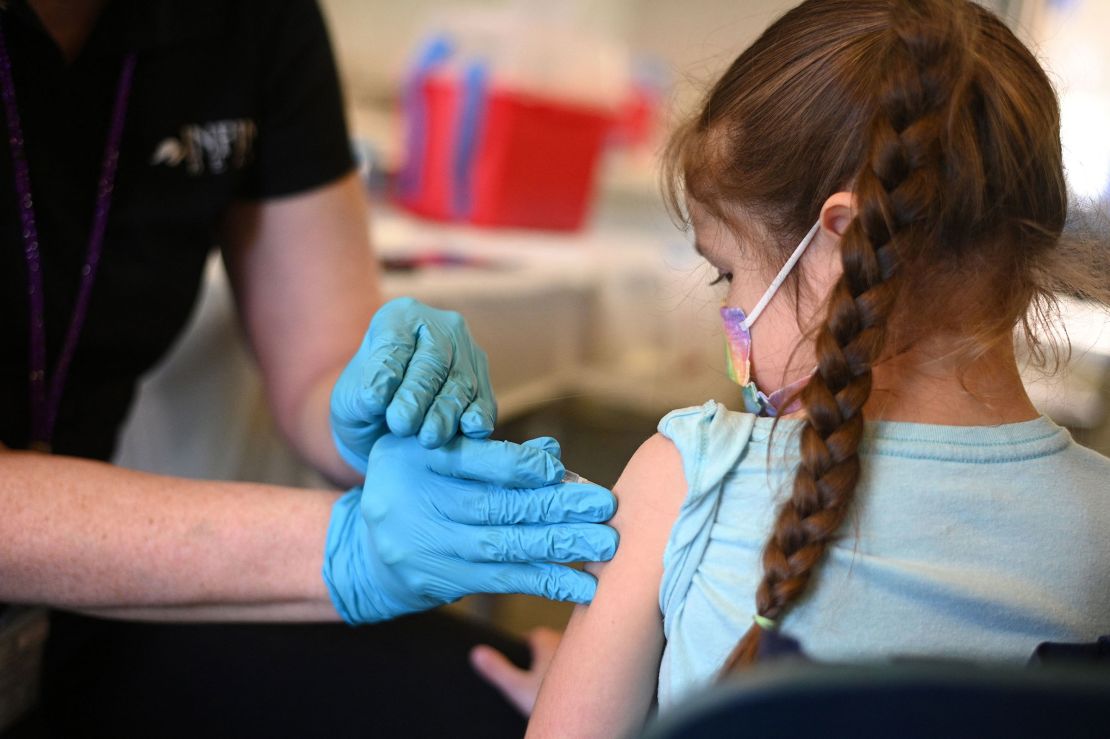CNN
—
Poor diet, environmental toxins, unhealthy habits and pharmaceuticals are contributing to a national rise in chronic illnesses, particularly among children, top Trump officials said in a Thursday report that lays the groundwork for a “Make America Healthy Again” overhaul of government policy.
Leaders of the MAHA Commission including Health and Human Services Secretary Robert F. Kennedy Jr. will present their conclusions, which echo many of Kennedy’s long held priorities, to President Donald Trump at a White House event Thursday afternoon.
The government panel is recommending that federal agencies reassess the nation’s childhood vaccine schedule, scrutinize ultraprocessed foods, and study pesticides widely used in commercial farming.
The report is the first step of the administration’s plan to address what President Trump has called a crisis of chronic disease in America. In a Feb. 13 executive order, Trump demanded an initial assessment of the potential drivers of chronic illnesses within 100 days; the commission is expected to deliver a strategy within the next 100 days.
Yet even before its release this week, farmers, food manufacturers, and some Republican lawmakers were raising concerns about the report’s implications for the American food supply, particularly its call to reassess pesticides approved for use by the Environmental Protection Agency.
Autism advocates and researchers have also railed against Kennedy’s suggestions that rates of autism spectrum disorders are booming due to environmental and pharmaceutical factors. The report suggests links between autism and food dyes or environmental toxins, but does not discuss Kennedy’s previous claims that there is a link between vaccines and autism.
It is also not clear how much the report’s broad recommendations to launch studies on nutritious food, vaccines and environmental exposures will cost.
“There is no budget,” Kennedy told reporters in a Thursday briefing. “At this point, there’s no concrete policy that could be funded in the budget; we’re going to work out the policy recommendations over the next 100 days.”
But, he added: “We’re going to save a lot more money in the long run and even in the short run, if we can reduce the numbers, which we intend to do during this administration.”
Vaccines and medicine
The MAHA commission calls for studies on the broad schedule of childhood vaccines, more research into potential adverse effects of vaccination, and “true” placebo studies of those childhood immunizations, echoing many of Kennedy’s longtime rallying points around vaccine safety. The commission encourages “open dialogue” around risks and benefits of vaccines.

While the report does not explicitly draw the disproven link between vaccination and autism, it notes that “many [parents] have concerns about the appropriate use of vaccines and their possible role in the growing childhood chronic disease crisis.”
Asked about subsequent studies on vaccines and autism, Kennedy told reporters that “the prescription comes in 100 days, how we’re going to handle it, but we’re already doing a lot of the research. We were not waiting for this report to come out to begin researching the crises, including the autism crisis.”
Officials recommend expanding a new project, linking the National Institutes of Health with Medicare and Medicaid data, to examine environmental factors in childhood diseases. HHS originally launched the platform this month to study potential causes and economic impacts of autism.
The report also states that American children are overprescribed pharmaceuticals, including ADHD medicines, antidepressants, asthma and GLP-1 drugs, as a result of “misaligned incentives” in the health care system. It cites research suggesting no clear benefit from antipsychotic antidepressant medicine in children.
It goes on to say that ADHD, depression and intellectual disabilities are diagnosed “disproportionately” in young children, leading to “unnecessary drugs, treatments, and social stigma.”
The commission’s report flagged studies that suggest links between commonly used atrazine- and glyphosate-based weedkillers, such as RoundUp, and illnesses including reproductive disorders, cancer and liver complications. But it quickly also cited research from the Food and Drug Administration and the EPA that states the vast majority of food samples and farming practices are compliant with federal regulations.
The EPA has previously said these products are unlikely to cause cancer. But media reports that the MAHA commission would likely highlight widely used herbicides led agricultural groups and lawmakers representing agricultural areas to attempt to get ahead of the report.
“We welcome efforts to improve health outcomes in America but recommendations to limit farming practices based on unproven theories could have severe unintended consequences,” The American Farm Bureau Federation said in statement Tuesday, ahead of the report’s release. “History teaches us that it takes a very long time to rebuild public confidence once it is lost – even if the loss is caused by incorrect or incomplete information. This is certainly true when it comes to the food system.”
In a statement to CNN, the National Corn Growers Association said it was deeply troubled by the report.
“Decades of extensive research and testing show that pesticides, including atrazine and glyphosate, can be applied safely for their intended uses,” the association said. “We call on the administration to respect the existing body of science on pesticides and, moving forward, to include America’s farmers in discussion as this process evolves.”
Mississippi Republican Sen. Cindy Hyde-Smith also raised this concern in a Senate Appropriations subcommittee hearing with Kennedy that day.
“If Americans lose confidence in the safety and integrity of our food supply due to the unfound claims that mislead consumers, public health will be at risk,” Hyde-Smith said.
Secretary of Agriculture Brooke Rollins told reporters Thursday that the report’s questions are intended to improve agricultural technology, not destabilize American confidence in the food supply.
“Do all of us agree on everything? Of course not. But the place that we have landed, which I think all of us agree, is that this is not a binary choice between an industry, agriculture, and health,” Rollins said. “What I have been very encouraged by, [with] Secretary Kennedy, when we were in Texas together and our dozens and dozens of conversations, is that none of this will compromise the ability of our American agriculture to do what they do best, which is to feed the country and the world.”
Food and nutrition

The report states that children are consuming too many ultra-processed grains, sugars and fats, contributing to childhood obesity and diabetes rates. It also cites food additives including artificial sweeteners and preservatives, that some research suggests could be associated with chronic illnesses.
The commission recommends independent studies on food ingredients that are generally recognized as safe, and long-term NIH trials comparing ultraprocessed food diets to whole food regimens.
“I think everybody wants to prioritize the ultra processed food crisis and try to reduce our reliance” on these foods, Kennedy told reporters on Thursday
The report also calls out industry lobbying and the “corporate capture” of health agencies long lamented by Kennedy.
“Evidence suggests that pharmaceutical money strongly influences congressional legislation through lobbying and the manipulation of patient advocacy groups, and exerts considerable financial control over the FDA and its employees,” it states, reflecting comments made by the health secretary to FDA employees last month.
The report goes on to detail lobbying efforts, advertising campaigns and scientific literature funding by pharmaceutical and food industries, laying the foundation for a crackdown that could be laid out in the commission’s subsequent strategy report.

